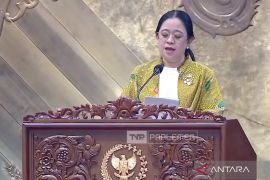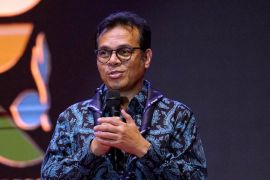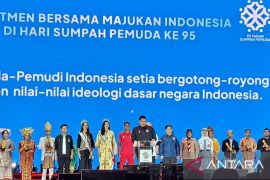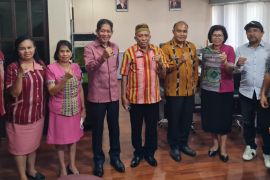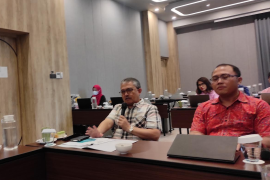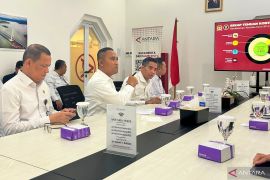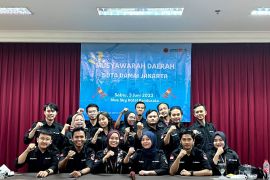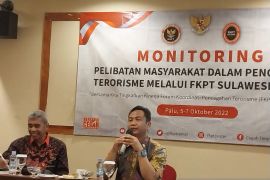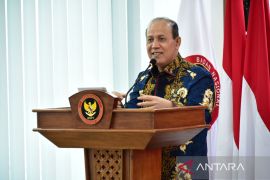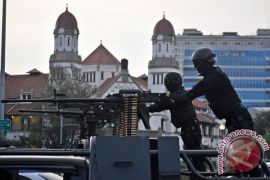However, over the years, the pledge has come to face a number of threats.
A number of intolerant groups who refuse to acknowledge Pancasila as Indonesia’s ideology and Indonesia’s republican form of government are disseminating radicalism to encourage the disintegration of the nation, observers have said.
They are also carrying out various terror attacks to spread fear among the community, they said.
The terror record in recent years has shown that the younger generation has been the main target of recruiters of radical groups who want to erode Indonesians’ spirit of nationalism.
Head of the Terrorism Study Program at the University of Indonesia, Muhammad Syauqillah, said that since 2000, most terror perpetrators have been found to belong to the productive age group.
Meanwhile, according to data from the National Counter-terrorism Agency (BNPT), in February 2017, more than 52 percent of terror inmates were aged 17-34 years.
In addition, the agency said that radicalism had entered the education sector, including colleges.
BNPT’s findings were in line with the results of a survey conducted by the Jakarta State Islamic University in 2018 on the religious attitudes of school and madrasa (Islamic school) teachers in Indonesia.
The survey had found that 50.87 percent of respondents from a total of 2,237 teachers (1,811 school teachers and 426 madrasa teachers) had radical and intolerant opinions.
Related news: BNPT encourages Indonesian youngsters to support anti-radicalism
The shadow of radicalism
The fact that Indonesia's younger generation has become a target of terror recruiters was proven by a series of suicide bombings in Surabaya on May 13-14, 2018 and in Makassar Cathedral Church on March 28, 2021.
The terror attack in Surabaya was carried out by three families, including teen children, while the attack in Makassar was conducted by a 25-year-old man and woman associated with the terrorist group Jamaah Ansharut Daulah (JAD), officials said.
The youths have become easy targets since radical groups are utilizing technology, such as social media that is commonly used by youngsters, to recruit new members nowadays.
According to the head of the BNPT, Commissioner General Boy Rafli Amar, the couple who carried out the suicide bombing at Makassar Cathedral Church assembled the bomb with the help of their recruiters through online training on social media.
Meanwhile, Syauqillah noted that radical groups’ recruitment pattern has continued to adapt with the changing time.
Earlier, for recruiting young people, the radical groups took advantage of family ties or marriage, he said.
Thus, it was often found that the terrorists’ family members were also members of radical organizations, he added.
In addition, the groups also spread their ideology through religious gatherings, he noted.
However, with the rapid development of technology, which is facilitating the dissemination of information through social media, recruitment by radical organizations has become rampant, he said.
The new model of radical propaganda has entered various social media, including YouTube, Facebook, Twitter, and Instagram, he added.
The groups use various narratives to glorify their ideologies and make their values acceptable to youngsters who are transitioning towards adulthood and therefore, can be easily influenced, he explained.
According to the deputy head of counter-extremism and terrorism at the Indonesian Council of Ulemas (BPET-MUI), Inspector General (Ret.) Hamli, organizations often use a variety of narratives for promoting their ideologies.
The first one is the militancy narrative which instills hatred toward certain groups that are referred as enemies, he said.
In addition, there are also narratives of being threatened and treated unfairly, terrorism conspiracy, as well as intolerance which involves various religious sentiments, he added.
Hamli said that the motive for most terror attacks in Indonesia was based on religious ideology as the radical groups were trying to use it to replace Pancasila -- Indonesia’s five principles of ideology.
Furthermore, he said that the groups -- who claimed to be religious but refused to be nationalistic – are also promoting their ideologies among the youth through universities.
Related news: Spirit of Youth Pledge protects youths from radicalism: MPR
Spirit of Youth Pledge to erase radicalism
As the nation commemorates the 93rd Youth Pledge, it is time for the younger generation to become more aware of their vulnerability to radicalism, he said.
The commemoration can also be used to encourage youngsters to actively fight radicalism and start to thoroughly explore the meaning and spirit of the pledge, he added.
The Youth Pledge is not just a set of words: it emerged from the awareness of Indonesian youths that their highly diverse nation stood united as the Unitary State of the Republic of Indonesia, he said.
Thus, it became the starting point for Indonesia’s young generation to realize the importance of maintaining the diversity of religions, ethnicities, cultures, and languages in the country under the pledge of unity and solidarity as an independent nation, he added.
Hence, the oath to uphold unity and solidarity should be nurtured from time to time, he said.
In addition, it is highly important for youngsters to thoroughly understand and implement the Pancasila, the 1945 Constitution, Bhinneka Tunggal Ika (Indonesia’s motto of ‘Unity in Diversity’), and the integrity of the Unitary State of the Republic of Indonesia, he added.
Their understanding regarding the nation’s four pillars must be strengthened as an antidote to disunity within the nation caused by radicalism, he explained.
In fighting radicalism, the younger generation can contribute even in the simplest steps, as suggested by Syauqillah and Hamli.
They have urged the youth to create various counter-narratives, counter-propaganda, and counter-ideologies on social media to overcome the narratives of radicalism.
The whole Indonesian nation, especially the younger generation, can also resist various forms of radical threats to the unity and integrity of the nation by always remembering that we all have one homeland, one nation, one language, they said.
Thus, the country will be victorious against radicalism and other threats forever, they added.
Related news: UI, NU collaborate to instill moral, national values in youth
Related news: Tourism Ministry, BNPT develop anti-radicalization program
Editor: Suharto
Copyright © ANTARA 2021


